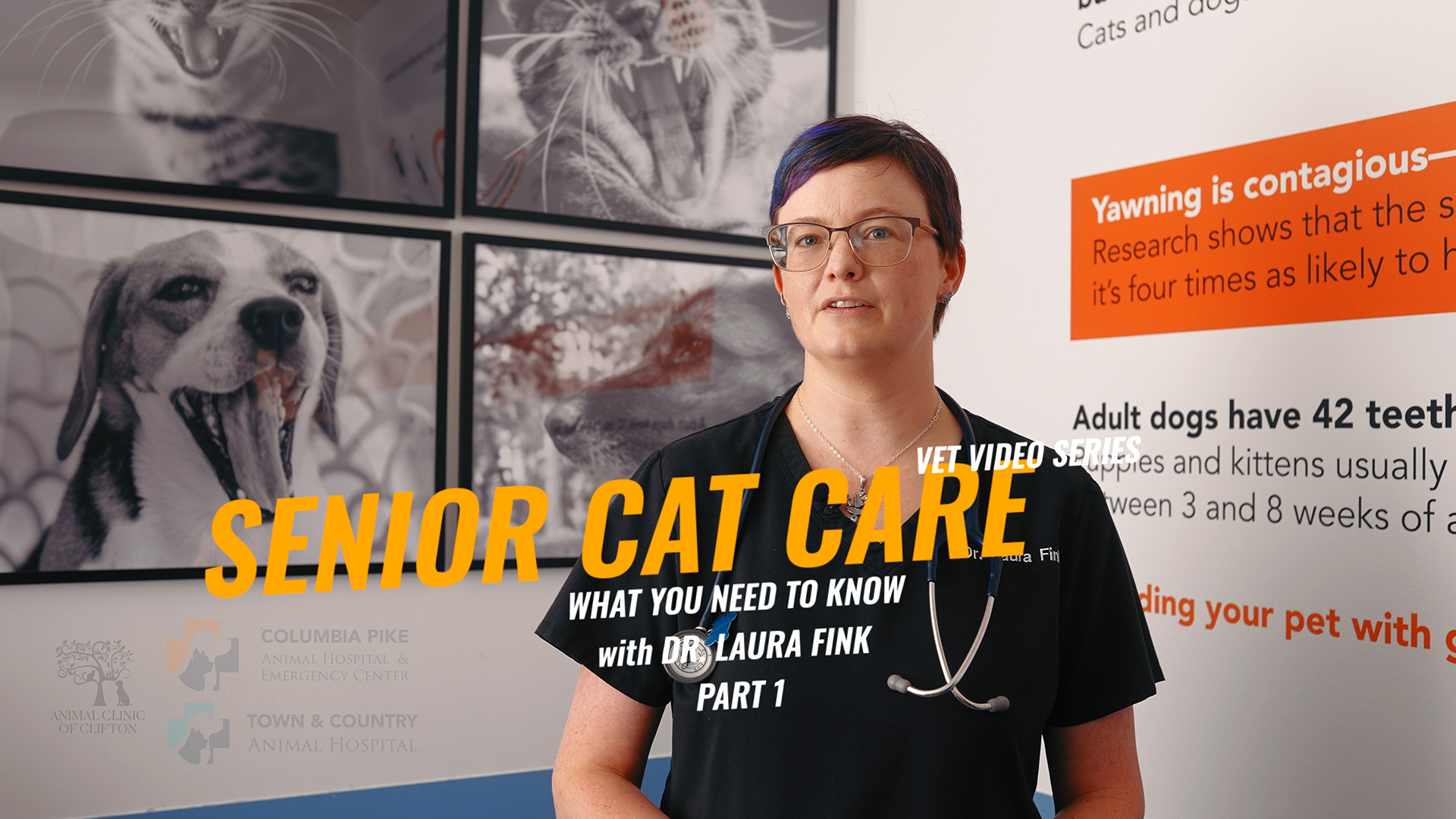November is Senior Pet Month, which makes this the perfect time to focus on how to support your aging cat and recognize the subtle signs that something may be changing with their health. Senior cats are masters at hiding discomfort, so a proactive approach can make a big difference in their quality of life.
In Part 1 of our Senior Cat Care Series, Dr. Laura Fink from Columbia Pike Animal Hospital and Emergency Center explains the early changes we see as cats age, what to look for at home, and how routine senior care can keep your cat comfortable and healthy.
Explore Our Wellness Plans
Small Changes Can Signal Big Things
Cats rarely show pain the way dogs or people do. Instead, owners often notice quiet behavioral changes, such as:
-
Less playful behavior
-
Longer naps or more hiding
-
Hesitation before jumping
-
No longer climbing onto favorite spots
-
Reduced interaction with the family
Because cats are naturally inclined to jump and perch, difficulty with heights is one of the most reliable early signs of arthritis or joint discomfort.
Common Senior Cat Health Concerns
Weight Loss
Weight loss is one of the most important red flags in older cats. It often happens slowly and can be hard to spot at home. A drop from ten pounds to eight and a half pounds over the course of a year may seem small, but it can signal underlying issues like hyperthyroidism, kidney disease, or chronic nausea. Regular exams and weight checks are essential.
Arthritis
Arthritis is extremely common in senior cats. They rarely limp or vocalize. Instead, they simply stop doing the things that hurt. If your cat no longer jumps on counters, avoids climbing, or is less social, pain management and supplements can help significantly.
Dental Disease
Dental concerns become more common with age. Plaque buildup leads to gum irritation, loose teeth, and infection. Cats are also prone to resorptive lesions, where the body begins breaking down the tooth itself. These lesions are very painful and usually require extraction to keep the cat comfortable.
Changes in Appetite or Water Intake
Litter boxes reveal what bowls do not. Larger urine clumps or water consumption changes can signal kidney disease, thyroid problems, or diabetes. Appetite changes, either higher or lower, also deserve attention.
Nutrition for Senior Cats
A high quality senior diet supports healthy aging. Reputable brands that use veterinary nutritionists and perform extensive product testing are recommended. For medical conditions, prescription diets may be advised.
If a cat is losing weight due to illness, treatment often restores appetite. Senior cats can also develop food aversions, so it may take some trial and error to find a food they enjoy.
Vaccines Still Matter for Senior Cats
Even indoor cats need up-to-date vaccinations.
Required for all cats:
-
Rabies vaccine
-
FVRCP vaccine every three years
Outdoor cats should also receive the feline leukemia vaccine.
Why Twice Yearly Exams Are Essential
Senior cats often look fine until disease is advanced. Regular senior checkups allow veterinarians to:
-
Track weight trends
-
Examine joints
-
Evaluate lymph nodes
-
Assess hydration and appetite
-
Detect dental disease
-
Perform blood work to identify kidney disease, thyroid disorders, and other conditions early
Finding problems early helps keep senior cats comfortable and active.
How Senior Wellness Plans Help
Explore Our Wellness Plans
Senior Wellness Plans provide consistent preventive care while helping families plan ahead for their pet’s needs. Senior plans may include:
-
Twice yearly wellness exams
-
Comprehensive annual bloodwork
-
Urinalysis
-
Parasite screening
-
Nutritional and weight management guidance
-
Discounts on additional services
These plans support early detection and help reduce surprise costs throughout the year.
Part 2 Coming Soon
Part 2 of our Senior Cat Care Series will explore diagnostics, long-term comfort care, treatment options, and ways to keep senior cats mentally and physically engaged.
If you have questions or want to schedule your cat’s senior wellness visit, our teams at Columbia Pike Animal Hospital and Emergency Center, Town & Country Animal Hospital, and Animal Clinic of Clifton are here to help.


